Happy 99th Birthday, Jimmy Carter
History is coming around about Jimmy Carter's presidency, and it's about time.
The Carter Center’s February 18th announcement—as plainspoken as the man whose condition it shared—was terse and left no doubt: After several brief hospital stays, Jimmy Carter, the 39th president of the United States—joined by his family and doctors—agreed he would spend his “remaining time” in hospice at his home in Plains, Georgia.
Retrospectives of his life and career began immediately. Oddly, his tenure as president from 1977 to 1981—and the extraordinary years on the international human rights activism that followed—were summed up best from the other side of the aisle. Craig Shirley, acclaimed historian, political consultant, and author of four books on Ronald Reagan wrote, "While bedeviled by myriad problems during his years in office, Carter has had one of the greatest second acts in American history”—a legacy that includes decades of championing free and fair elections all over the world and bartering peace agreements that have saved countless lives.
James Earl Carter, Jr—or just the ever-preferred “Jimmy”—was born in Plains, Georgia on October 1, 1924, to James Earl Carter, Sr., a farmer and businessman, and Lillian Gordy Carter, a registered nurse. He was the first president born in a hospital.
During his early childhood, the Carter family moved several times, finally settling in a house on a dirt road in Archery, near Plains. He got along well with his parents, and soon he had siblings—Gloria, then Ruth, then Billy—whom he loved just as much.
He was industrious enough that his father gave him an acre of farmland, and young Jimmy became a farmer who grew, packaged and marketed peanuts. He also went into the real estate business, purchasing a section of tenant housing and renting it out.
As a teenager Jimmy Carter joined the FFA (the Future Farmers of America), played basketball, read voraciously, and developed a lifelong love of woodworking. He doesn’t seem to have got himself into too much trouble—though a joyride through town in a hot rod during school hours did make the papers. And he had a dream: he wanted to attend the U.S. Naval Academy—and he made it there by taking a circuitous route through Georgia Southwestern College and Georgia Tech, from which he earned entry into Annapolis. And just before he returned to the Academy for his final year, he encountered the love of his life.
A three-year-old Jimmy Carter met Eleanor Rosalynn Smith in 1927 just a day after she was born. Later, Rosalynn and Jimmy’s sister Ruth became friends. Home from Annapolis in the summer before his final year at Annapolis, Jimmy’s planned date fell through, so he asked Rosalynn out on a double date with Ruth and her boyfriend. The next day he told his mother he was going to marry her—and he did, shortly after his graduation, with distinction, from the Naval Academy in 1946 with Bachelor of Science degree. After two years’ surface ship duty, Carter applied for and was granted submarine duty, serving as executive officer, engineering officer, and electronics repair officer on the submarine SSK-1. When Admiral Hyman G. Rickover (then a captain) started his program to create nuclear-powered submarines, he chose Carter to join the program. He served on temporary duty with the Naval Reactors Branch, U.S. Atomic Energy Commission, Washington, D.C., to assist "in the design and development of nuclear propulsion plants for naval vessels." He risked his life to defuse a nuclear risk aboard a Canadian submarine.
In 1953, Carter’s father died, and he immediately resigned from the Navy to return home to Georgia to manage the Carter family’s businesses, reviving the peanut farm. He became an anti-segregation activist almost immediately upon his return, supporting the nascent civil rights movement in the South and becoming active in the Democratic Party in Georgia.
From 1963 to 1967 he served in the Georgia State Senate and in 1970 was elected governor of Georgia. As a dark horse candidate virtually unknown outside Georgia, Carter won the 1976 Democratic presidential nomination and defeated Gerald Ford in the presidential election.
Writes Kai Bird for the New York Times:
He decided to use power righteously, ignore politics and do the right thing. He was, in fact, a fan of the establishment’s favorite Protestant theologian, Reinhold Niebuhr, who wrote, “It is the sad duty of politics to establish justice in a sinful world.” Mr. Carter, a Niebuhrian Southern Baptist, was a church of one, a true outlier. He “thought politics was sinful,” said his vice president, Walter Mondale. “The worst thing you could say to Carter if you wanted him to do something was that it was politically the best thing to do.” Mr. Carter routinely rejected astute advice from his wife, Rosalynn, and others to postpone politically costly initiatives, like the Panama Canal treaties, to his second term.
Ironically, the Iran Hostage Crisis, which plagued his presidency, was a crisis not of his making. Stemming from a 50-year rage on the part of mullahs furious at a loss of power and the liberalization of Iranian culture that had been going on since the Egyptian national movement of 1899-1900—and fueled by the CIA-British Petroleum deposition of democratically election Mohammad Mossadegh and his replacement by the profoundly corrupt, vicious, greedy, profligate and profane Shah Reza Pahlavi—the Ayatollah Ruhollah Khomeini was swept into power by a movement with tremendous popular support in Iran. Against the advice or Rosalynn, Kissinger and Mondale, Carter refused to give asylum to the deposed Shah, fearing that doing so would cause the Revolutionary government to turn on the American embassy in Tehran. When Carter finally allowed the Shah, who was suffering from cancer, into the United States for treatment, the rage against the West and the USA in particular boiled over, and the embassy came under siege. For 444 days—until the inauguration of Ronald Reagan—Iranian militarized college students held 52 Americans hostage.
And this is what caused Jimmy Carter to lose his re-election bid—but recent evidence suggests that a GOP team, headed by John Connally, the former governor of Texas who had been wounded in the motocade car during the assassination of John F. Kennedy, had conspired with the Iranian government to hold off the resolution of the crisis until after the election to falsely pin responsibility for the crisis on Carter. [continued below]
For a thorough discussion of the GOP’s plot by one involved, please see:
As Carter celebrates his 99th birthday, one of the things that is cheering him after seven months of hospice care, is the ongoing and thorough re-evaluation of his presidency, long dismissed as a failure. Chief among them is the revelation above, but there is also a resurfacing of memory about all he accomplished:
From Kai Bird of the New York Times:
His presidency is remembered, simplistically, as a failure, yet it was more consequential than most recall. He delivered the Camp David peace accords between Egypt and Israel, the SALT II arms control agreement, normalization of diplomatic and trade relations with China and immigration reform. He made the principle of human rights a cornerstone of U.S. foreign policy, planting the seeds for the unraveling of the Cold War in Eastern Europe and Russia.
He deregulated the airline industry, paving the way for middle-class Americans to fly for the first time in large numbers, and he deregulated natural gas, laying the groundwork for our current energy independence. He worked to require seatbelts or airbags, which would go on to save 9,000 American lives each year. He inaugurated the nation’s investment in research on solar energy and was one of the first presidents to warn us about the dangers of climate change. He rammed through the Alaska Land Act, tripling the size of the nation’s protected wilderness areas. His deregulation of the home-brewing industry opened the door to America’s thriving boutique beer industry. He appointed more African Americans, Hispanics and women to the federal bench, substantially increasing their numbers.
But some of his controversial decisions, at home and abroad, were just as consequential. He took Egypt off the battlefield for Israel, but he always insisted that Israel was also obligated to suspend building new settlements in the West Bank and allow the Palestinians a measure of self-rule.
After Jimmy Carter lost his re-election bid, he and Rosalynn went home to Georgia and the former president immediately became depressed. Then one night, Rosalynn woke up to find Jimmy sitting upright in bed. “I know what we’ll do,” he said. They would launch The Carter Center, which was inaugurated in coordination with Emory University. Its principal endeavors are the prevention and resolution of conflict, and to this end Carter has worked on international conflicts and monitored elections in more than 80 countries. In recognition of his immense contribution to worldwide peace, health initiatives, and education in economically stressed countries, he was awarded the 2002 Nobel Peace Prize.
But the longtime lover of carpentry wasn’t done. He became a prime mover and the most recognizable face of Habitat for Humanity.
He and Rosalynn have helped build houses all over the United States. Jimmy likes detail carpentry because he likes doing the fine, intricate stuff.
Jimmy Carter has had the most spectacularly inspiring and useful post-presidency in the history of the presidency. He became the man who prevented wars, secured fair elections, fought epidemic diseases, championed climate change protections … and built houses for poor families with his own hands. In this sense, he became the living example of what he has long believed:
“In our democracy, the only title higher and more powerful than that of president is the title of citizen. It is every citizen’s right and duty to help shape the future legacy of our nation.”
Happy Birthday, Citizen. We are forever in your debt.
Books by Jimmy Carter.
Keeping Faith: Memoirs of a President (1983), Turning Point (1992), and An Hour Before Daylight (2001).


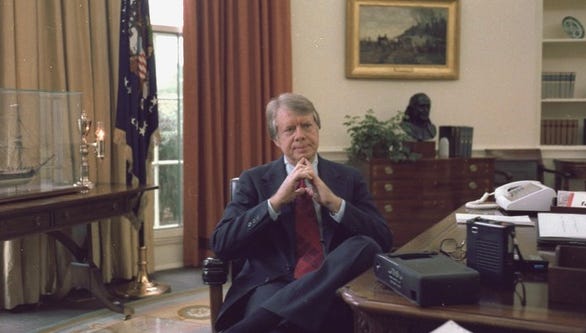
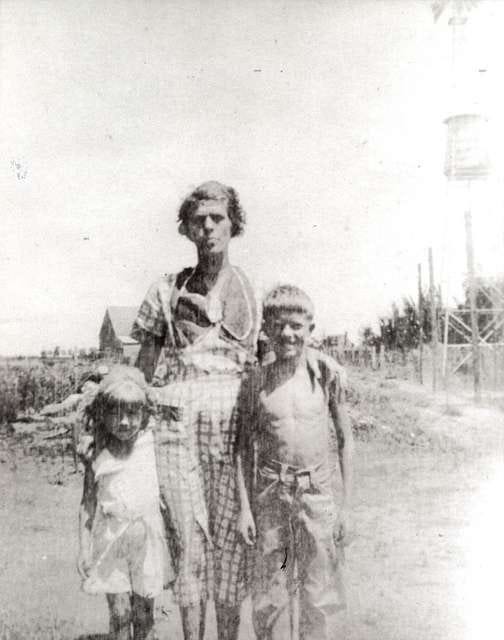
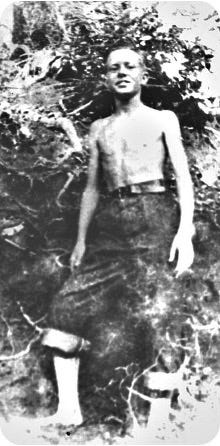
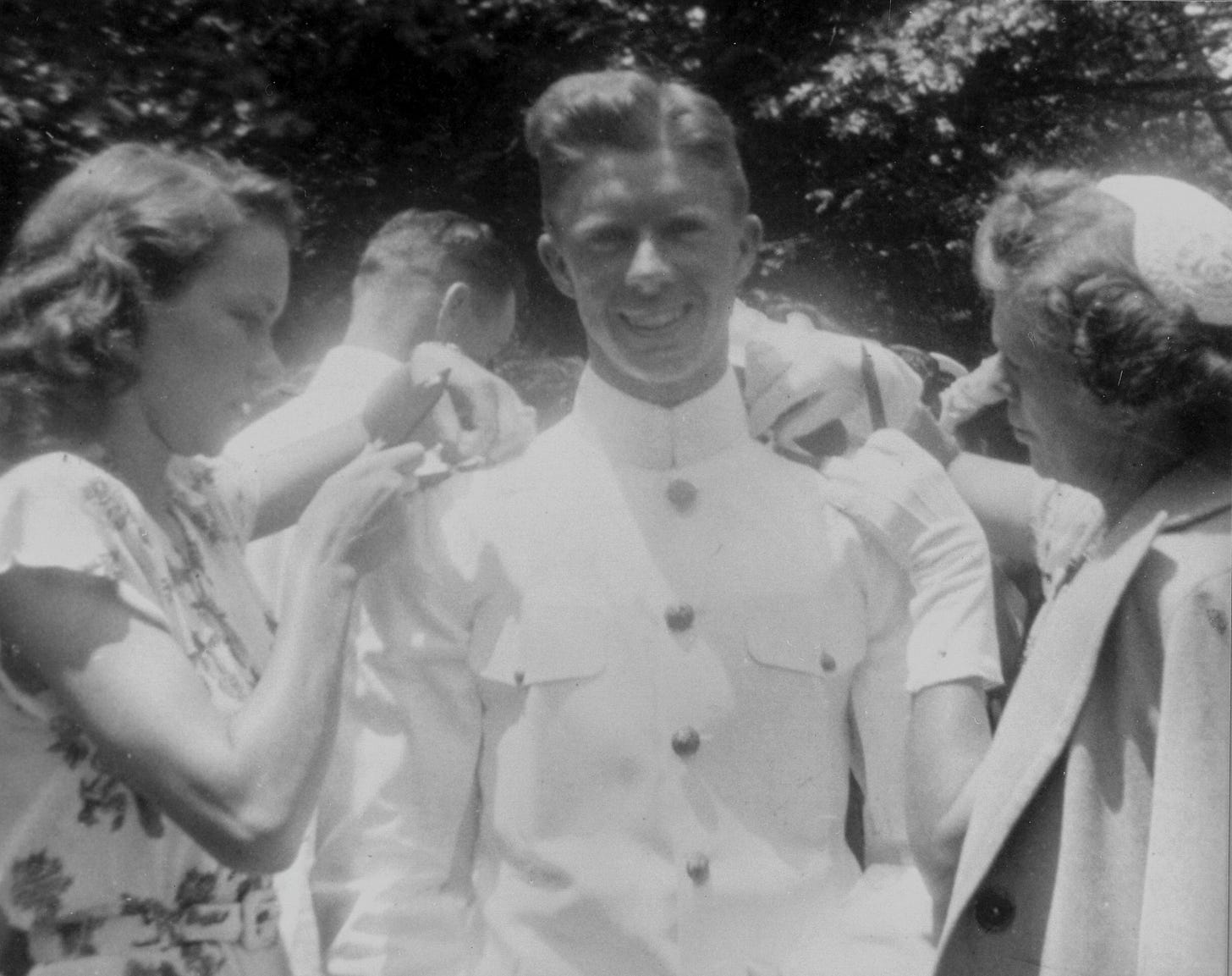
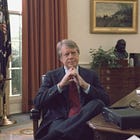
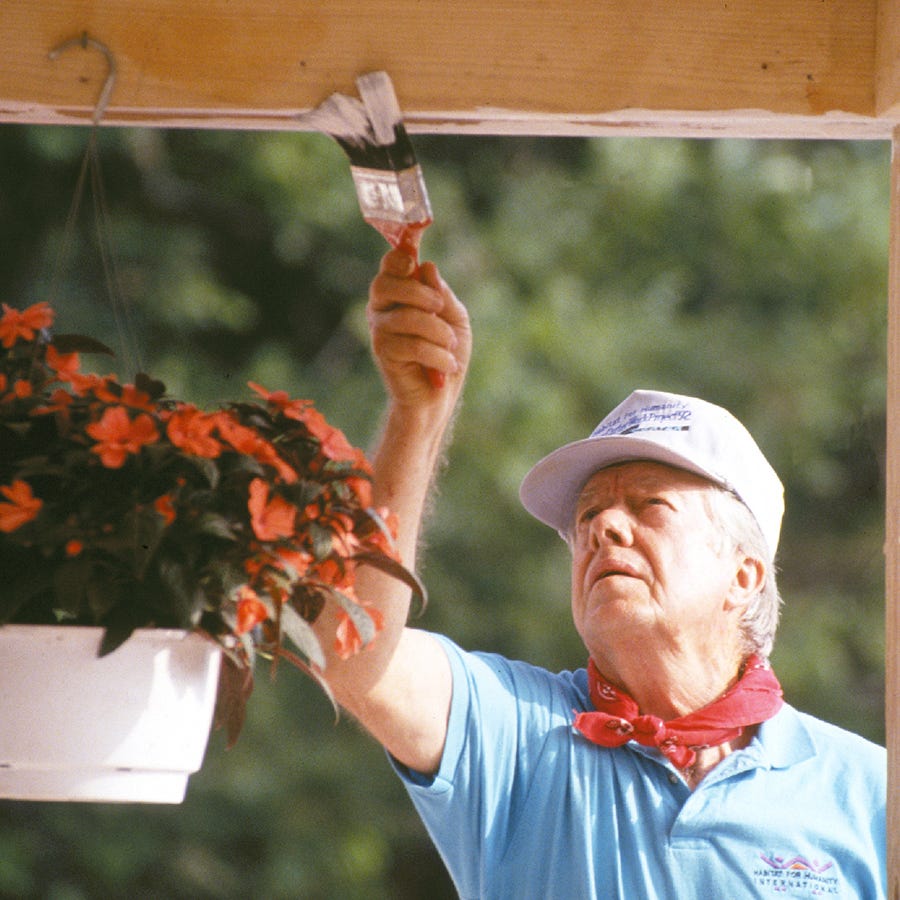
Thank you all for getting facts into the daylight of American History.
Why we wait so long????? and consequently lose sight of truth is still our failure as an educated citizenry.
This is an excellent look at a truly humble person. His administration really was a unique and important part of our nation’s history.